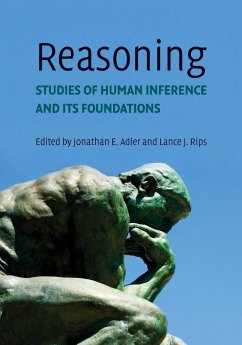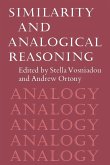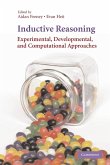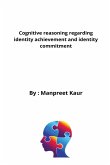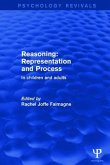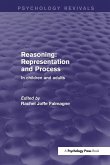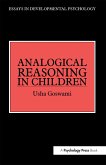Reasoning
Herausgeber: Adler, Jonathan E.; Rips, Lance J.
Reasoning
Herausgeber: Adler, Jonathan E.; Rips, Lance J.
- Broschiertes Buch
- Merkliste
- Auf die Merkliste
- Bewerten Bewerten
- Teilen
- Produkt teilen
- Produkterinnerung
- Produkterinnerung
An interdisciplinary collection of major essays on reasoning by a well-known group of philosophers, psychologists and cognitive scientists.
Andere Kunden interessierten sich auch für
![Similarity and Analogical Reasoning Similarity and Analogical Reasoning]() Stella Vosniadou / Andrew Ortony (eds.)Similarity and Analogical Reasoning90,99 €
Stella Vosniadou / Andrew Ortony (eds.)Similarity and Analogical Reasoning90,99 €![Inductive Reasoning Inductive Reasoning]() Aidan Feeney / Evan Heit (eds.)Inductive Reasoning37,99 €
Aidan Feeney / Evan Heit (eds.)Inductive Reasoning37,99 €![Beyond Reasoning Beyond Reasoning]() Ken ManktelowBeyond Reasoning195,99 €
Ken ManktelowBeyond Reasoning195,99 €![Cognitive reasoning regarding identity achievement and identity commitment Cognitive reasoning regarding identity achievement and identity commitment]() Manpreet KaurCognitive reasoning regarding identity achievement and identity commitment45,99 €
Manpreet KaurCognitive reasoning regarding identity achievement and identity commitment45,99 €![Reasoning Reasoning]() Rachel Joffe FalmagneReasoning190,99 €
Rachel Joffe FalmagneReasoning190,99 €![Reasoning Reasoning]() Rachel Joffe FalmagneReasoning70,99 €
Rachel Joffe FalmagneReasoning70,99 €![Analogical Reasoning in Children Analogical Reasoning in Children]() Usha GoswamiAnalogical Reasoning in Children74,99 €
Usha GoswamiAnalogical Reasoning in Children74,99 €-
-
-
An interdisciplinary collection of major essays on reasoning by a well-known group of philosophers, psychologists and cognitive scientists.
Hinweis: Dieser Artikel kann nur an eine deutsche Lieferadresse ausgeliefert werden.
Hinweis: Dieser Artikel kann nur an eine deutsche Lieferadresse ausgeliefert werden.
Produktdetails
- Produktdetails
- Verlag: Cambridge University Press
- Seitenzahl: 1072
- Erscheinungstermin: 27. Juli 2018
- Englisch
- Abmessung: 254mm x 178mm x 57mm
- Gewicht: 1967g
- ISBN-13: 9780521612746
- ISBN-10: 0521612748
- Artikelnr.: 24818964
- Herstellerkennzeichnung
- Libri GmbH
- Europaallee 1
- 36244 Bad Hersfeld
- gpsr@libri.de
- Verlag: Cambridge University Press
- Seitenzahl: 1072
- Erscheinungstermin: 27. Juli 2018
- Englisch
- Abmessung: 254mm x 178mm x 57mm
- Gewicht: 1967g
- ISBN-13: 9780521612746
- ISBN-10: 0521612748
- Artikelnr.: 24818964
- Herstellerkennzeichnung
- Libri GmbH
- Europaallee 1
- 36244 Bad Hersfeld
- gpsr@libri.de
Preface
List of contributors
Introduction: philosophical foundations
Part I. Foundations of Reasoning: Section 1. Some Philosophical Viewpoints: 1. Change in view: principles of reasoning
2. Belief and the will
3. Internal and external reasons
4. Paradoxes
Section 2. Fallacies and Rationality: 5. When rationality fails
6. Extensional versus intuitive reasoning: the conjunction fallacy in probability judgment
7. Can human irrationality be experimentally demonstrated?
8. Breakdown of will
Part II. Modes of Reasoning: Section 3. Deductive Reasoning: 9. Logical approaches to human deductive reasoning
10. Mental modes and deductive reasoning
11. Interpretation, representation, and deductive reasoning
12. Reasoning with quantifiers
13. The problem of deduction
Section 4. Induction: 14. Patterns, rules, and inferences
15. Inductive logic and inductive reasoning
16. Reasoning in conceptual spaces
17. Category-based induction
18. When explanations compete: the role of explanatory coherence on judgments of likelihood
19. Properties of inductive reasoning
Section 5. Dual and Integrative Approaches: 20. Human reasoning and argumentation: the probabalistic approach
21. Individual differences in reasoning and the algorithmic/intentional level distinction in cognitive science
22. Reasoning, decision making, and rationality
Section 6. Abduction and Belief Change: 23. Defeasible reasoning
24. Explanatory coherence
25. Belief revision
26. Belief, doubt, and evidentialism
27. Reflections on conscious reflection: mechanisms of impairment by reasons analysis
28. Belief change as propositional update
Section 7. Causal and Counterfactual Reasoning: 29. Causal thinking
30. Causation
31. Propensities and counterfactuals: the loser that almost won
Section 8. Argumentation: 32. The layout of arguments
33. The skills of argument
34. Reasoning and conversation
Part III. Interactions of Reasoning in Human Thought: Section 9. Reasoning and Pragmatics: 35. Specificationism
36. Presupposition, attention, and why-questions
37. Further notes on logic and conversation
38. The social context of reasoning: conversational inference and rational judgment
Section 10. Domain-Specific, Goal-Based, and Evolutionary Approaches: 39. Domain-specific knowledge and conceptual change
40. Pragmatic reasoning schemas
41. Beyond intuition and instinct blindness: toward an evolutionarily rigorous cognitive science
42. Use or misuse of the selection task? Rejoinder to Fiddick, Cosmides, and Tooby
43. Why we are so good at catching cheaters
44. The modularity of mind: an essay on faculty psychology
45. Commitment Brian Skyrms
46. Evolution of inference
Section 11. Reasoning across Cultures: 47. Reasoning across cultures
48. Culture and systems of thought: holistic versus analytic cognition
49. On the very idea of a conceptual scheme
50. The truth in relativism
Section 12. Biology, Emotions, and Reasoning: 51. Logic and biology: emotional inference and emotions in reasoning
52. Distinct brain loci in deductive versus probabilistic reasoning
53. The emotional dog and its rational tail: a social intuitionist approach to moral judgment
Index.
List of contributors
Introduction: philosophical foundations
Part I. Foundations of Reasoning: Section 1. Some Philosophical Viewpoints: 1. Change in view: principles of reasoning
2. Belief and the will
3. Internal and external reasons
4. Paradoxes
Section 2. Fallacies and Rationality: 5. When rationality fails
6. Extensional versus intuitive reasoning: the conjunction fallacy in probability judgment
7. Can human irrationality be experimentally demonstrated?
8. Breakdown of will
Part II. Modes of Reasoning: Section 3. Deductive Reasoning: 9. Logical approaches to human deductive reasoning
10. Mental modes and deductive reasoning
11. Interpretation, representation, and deductive reasoning
12. Reasoning with quantifiers
13. The problem of deduction
Section 4. Induction: 14. Patterns, rules, and inferences
15. Inductive logic and inductive reasoning
16. Reasoning in conceptual spaces
17. Category-based induction
18. When explanations compete: the role of explanatory coherence on judgments of likelihood
19. Properties of inductive reasoning
Section 5. Dual and Integrative Approaches: 20. Human reasoning and argumentation: the probabalistic approach
21. Individual differences in reasoning and the algorithmic/intentional level distinction in cognitive science
22. Reasoning, decision making, and rationality
Section 6. Abduction and Belief Change: 23. Defeasible reasoning
24. Explanatory coherence
25. Belief revision
26. Belief, doubt, and evidentialism
27. Reflections on conscious reflection: mechanisms of impairment by reasons analysis
28. Belief change as propositional update
Section 7. Causal and Counterfactual Reasoning: 29. Causal thinking
30. Causation
31. Propensities and counterfactuals: the loser that almost won
Section 8. Argumentation: 32. The layout of arguments
33. The skills of argument
34. Reasoning and conversation
Part III. Interactions of Reasoning in Human Thought: Section 9. Reasoning and Pragmatics: 35. Specificationism
36. Presupposition, attention, and why-questions
37. Further notes on logic and conversation
38. The social context of reasoning: conversational inference and rational judgment
Section 10. Domain-Specific, Goal-Based, and Evolutionary Approaches: 39. Domain-specific knowledge and conceptual change
40. Pragmatic reasoning schemas
41. Beyond intuition and instinct blindness: toward an evolutionarily rigorous cognitive science
42. Use or misuse of the selection task? Rejoinder to Fiddick, Cosmides, and Tooby
43. Why we are so good at catching cheaters
44. The modularity of mind: an essay on faculty psychology
45. Commitment Brian Skyrms
46. Evolution of inference
Section 11. Reasoning across Cultures: 47. Reasoning across cultures
48. Culture and systems of thought: holistic versus analytic cognition
49. On the very idea of a conceptual scheme
50. The truth in relativism
Section 12. Biology, Emotions, and Reasoning: 51. Logic and biology: emotional inference and emotions in reasoning
52. Distinct brain loci in deductive versus probabilistic reasoning
53. The emotional dog and its rational tail: a social intuitionist approach to moral judgment
Index.
Preface
List of contributors
Introduction: philosophical foundations
Part I. Foundations of Reasoning: Section 1. Some Philosophical Viewpoints: 1. Change in view: principles of reasoning
2. Belief and the will
3. Internal and external reasons
4. Paradoxes
Section 2. Fallacies and Rationality: 5. When rationality fails
6. Extensional versus intuitive reasoning: the conjunction fallacy in probability judgment
7. Can human irrationality be experimentally demonstrated?
8. Breakdown of will
Part II. Modes of Reasoning: Section 3. Deductive Reasoning: 9. Logical approaches to human deductive reasoning
10. Mental modes and deductive reasoning
11. Interpretation, representation, and deductive reasoning
12. Reasoning with quantifiers
13. The problem of deduction
Section 4. Induction: 14. Patterns, rules, and inferences
15. Inductive logic and inductive reasoning
16. Reasoning in conceptual spaces
17. Category-based induction
18. When explanations compete: the role of explanatory coherence on judgments of likelihood
19. Properties of inductive reasoning
Section 5. Dual and Integrative Approaches: 20. Human reasoning and argumentation: the probabalistic approach
21. Individual differences in reasoning and the algorithmic/intentional level distinction in cognitive science
22. Reasoning, decision making, and rationality
Section 6. Abduction and Belief Change: 23. Defeasible reasoning
24. Explanatory coherence
25. Belief revision
26. Belief, doubt, and evidentialism
27. Reflections on conscious reflection: mechanisms of impairment by reasons analysis
28. Belief change as propositional update
Section 7. Causal and Counterfactual Reasoning: 29. Causal thinking
30. Causation
31. Propensities and counterfactuals: the loser that almost won
Section 8. Argumentation: 32. The layout of arguments
33. The skills of argument
34. Reasoning and conversation
Part III. Interactions of Reasoning in Human Thought: Section 9. Reasoning and Pragmatics: 35. Specificationism
36. Presupposition, attention, and why-questions
37. Further notes on logic and conversation
38. The social context of reasoning: conversational inference and rational judgment
Section 10. Domain-Specific, Goal-Based, and Evolutionary Approaches: 39. Domain-specific knowledge and conceptual change
40. Pragmatic reasoning schemas
41. Beyond intuition and instinct blindness: toward an evolutionarily rigorous cognitive science
42. Use or misuse of the selection task? Rejoinder to Fiddick, Cosmides, and Tooby
43. Why we are so good at catching cheaters
44. The modularity of mind: an essay on faculty psychology
45. Commitment Brian Skyrms
46. Evolution of inference
Section 11. Reasoning across Cultures: 47. Reasoning across cultures
48. Culture and systems of thought: holistic versus analytic cognition
49. On the very idea of a conceptual scheme
50. The truth in relativism
Section 12. Biology, Emotions, and Reasoning: 51. Logic and biology: emotional inference and emotions in reasoning
52. Distinct brain loci in deductive versus probabilistic reasoning
53. The emotional dog and its rational tail: a social intuitionist approach to moral judgment
Index.
List of contributors
Introduction: philosophical foundations
Part I. Foundations of Reasoning: Section 1. Some Philosophical Viewpoints: 1. Change in view: principles of reasoning
2. Belief and the will
3. Internal and external reasons
4. Paradoxes
Section 2. Fallacies and Rationality: 5. When rationality fails
6. Extensional versus intuitive reasoning: the conjunction fallacy in probability judgment
7. Can human irrationality be experimentally demonstrated?
8. Breakdown of will
Part II. Modes of Reasoning: Section 3. Deductive Reasoning: 9. Logical approaches to human deductive reasoning
10. Mental modes and deductive reasoning
11. Interpretation, representation, and deductive reasoning
12. Reasoning with quantifiers
13. The problem of deduction
Section 4. Induction: 14. Patterns, rules, and inferences
15. Inductive logic and inductive reasoning
16. Reasoning in conceptual spaces
17. Category-based induction
18. When explanations compete: the role of explanatory coherence on judgments of likelihood
19. Properties of inductive reasoning
Section 5. Dual and Integrative Approaches: 20. Human reasoning and argumentation: the probabalistic approach
21. Individual differences in reasoning and the algorithmic/intentional level distinction in cognitive science
22. Reasoning, decision making, and rationality
Section 6. Abduction and Belief Change: 23. Defeasible reasoning
24. Explanatory coherence
25. Belief revision
26. Belief, doubt, and evidentialism
27. Reflections on conscious reflection: mechanisms of impairment by reasons analysis
28. Belief change as propositional update
Section 7. Causal and Counterfactual Reasoning: 29. Causal thinking
30. Causation
31. Propensities and counterfactuals: the loser that almost won
Section 8. Argumentation: 32. The layout of arguments
33. The skills of argument
34. Reasoning and conversation
Part III. Interactions of Reasoning in Human Thought: Section 9. Reasoning and Pragmatics: 35. Specificationism
36. Presupposition, attention, and why-questions
37. Further notes on logic and conversation
38. The social context of reasoning: conversational inference and rational judgment
Section 10. Domain-Specific, Goal-Based, and Evolutionary Approaches: 39. Domain-specific knowledge and conceptual change
40. Pragmatic reasoning schemas
41. Beyond intuition and instinct blindness: toward an evolutionarily rigorous cognitive science
42. Use or misuse of the selection task? Rejoinder to Fiddick, Cosmides, and Tooby
43. Why we are so good at catching cheaters
44. The modularity of mind: an essay on faculty psychology
45. Commitment Brian Skyrms
46. Evolution of inference
Section 11. Reasoning across Cultures: 47. Reasoning across cultures
48. Culture and systems of thought: holistic versus analytic cognition
49. On the very idea of a conceptual scheme
50. The truth in relativism
Section 12. Biology, Emotions, and Reasoning: 51. Logic and biology: emotional inference and emotions in reasoning
52. Distinct brain loci in deductive versus probabilistic reasoning
53. The emotional dog and its rational tail: a social intuitionist approach to moral judgment
Index.

